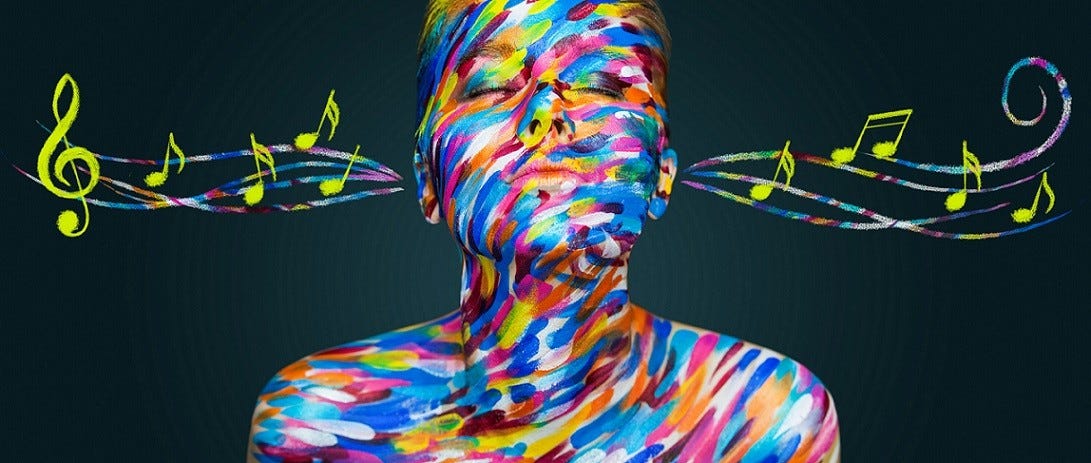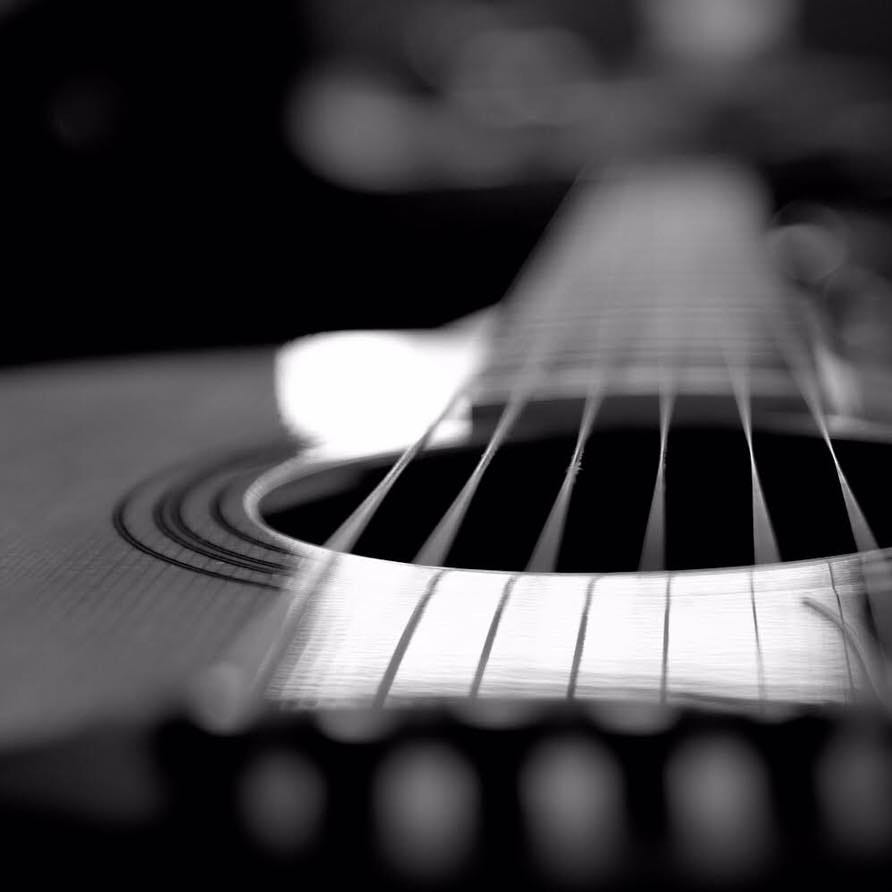You Don’t Always Have To Be A 'Warrior'
A personal perspective on healing and the cancer ‘journey’ (and music)
Hi friends,
Thanks for reading! If you enjoy today’s post… please share.
Did you know that if you hit the heart at the top or the bottom of this email you will make my day and it will make it easier for others to find this publication. Thanks!
First off, I want to say that everything below, all of my thoughts here, are from observation and not experience. But I want to reflect on this idea as it keeps coming up in music therapy sessions with those who are working their way through a cancer journey.
What are some words and phrases that we constantly hand out to those who are in the throes of cancer treatment – “Fight.” “Warrior.” “Survivor.” “Battle.” “You got this.” “You’re strong.”
But what if they don’t want to be ‘strong’? What if they’re about to lose that ‘fight’? Or are at the point where they are accepting their fate and making a decision to move towards palliative or hospice care? What then? Did they lose? Did they lose the ‘battle’? Did they not ‘fight’ hard enough? And does that mean, perhaps, it’s their fault?
There are many emotional levels when working through “having cancer”. And yes, sometimes there are moments when one wants to fight and may find empowerment in it. But that journey is personal to those who are on it. And if the idea of being a warrior or fighter is not helping or needed at the moment, well… okay. (And who are we—those of us who are fortunately not working through that journey—to suggest to someone that they should, or need to, ‘fight’.) Sometimes one may need to just be ‘in it’. Need to feel what they are feeling. Sit with it. Process it. And yes, they certainly are allowed to feel defeated, or scared, or feel sorry for themselves. It’s their journey. Maybe one sometimes feels so defeated that they just want to lie in bed… without shame.
I facilitate a weekly music therapy group for the organization Life With Cancer. The members are at various points on their cancer journeys. Not long ago I brought in a song for us to listen to together. It was a ‘fight’ song that someone shared with me (they were in the hospital going through treatment) and I thought I would share it with the group and see what they thought. I then I would ask what their ‘fight’ songs were. (I mean, everyone going through cancer has a ‘fight’ song, right?)
After we listened to the song, the first comment was, “That’s a good song. But I’m not sure how I feel about fight songs. Or the idea of fighting.” I asked if she could speak more on that, and she said, “Well, fighting, or battling, I don’t know. What if you lose the battle? Did you fail?” Others agreed. There seemed to be a consensus on ‘fight’ songs. There were head nods as if to say, “Yeah, I’ve heard this before.”
That put a lot into perspective for me. I never really thought of it that way. [And admittedly, I felt a bit insensitive at that moment.]
But it opened up a great conversation. Someone else in the group said, “I like that song. I feel like I need a new fight song. I’ve been feeling stuck. I need some motivation right now.” Again, there were heads shaking. And then… “It really depends on the day. Some days I need motivation, like a push. But some days I just want to lie on the couch and not feel guilty about it. And when I feel that way, I don’t want to hear about fighting.” Many head nods.
It made me fully realize that it’s truly a personal journey. There’s no ‘one size fits all’ approach. This is personal unto each and every one going through it. And they get to decide. They get to be the ones to choose if they want to fight. Or not. And for those of us who are supporting them. We need to realize that. We need to honor that.
Music gives you what you need when you need it
And this is one of the reasons why music, and music therapy, can be a great support for those going through the cancer journey. Why? Because music gives you what you need when you need it. Sometimes you may need that fight song. You may need Katy Perry’s Roar, or Tom Petty’s I Won’t Back Down. But sometimes you may need something more melancholy, something that represents what you are feeling at that moment. Something that offers empathy and validation. Perhaps you may need Everybody Hurts by R.E.M. or Fix You by Coldplay. After all, sometimes you just need to feel what you are feeling. And music can support that.
Music is subjective. And so is someone’s approach to how they navigate their cancer journey. While no one should tell you what music you ‘should’ listen to, no one should tell someone with cancer how they ‘should’ go through their process.
And in my experience, for those who are suffering—in pain, scared, unsure—it’s often the melancholy music that is more profound, more supportive, more powerful, and more helpful on an emotional level. We often have trouble expressing what we are feeling inside. Music can speak for us when we can’t find the words. Music also brings, prompts, and releases held in emotions, and music is aesthetic and there is inherent beauty in it. It’s the perfect dichotomy of projecting what is being felt against what wants to be felt.
There is a unique comfort in the melancholy expressed through music. Again, those songs provide empathy and give a sense of ‘you are not alone in what you are feeling.’ And that can be empowering.
“A moon-lit sonata can be therapeutic for people experiencing loss or depression; it can help us to accept negative emotions rather than ignoring or repressing them; it can show us that we’re not alone in our sorrows.” Susan Cain, in her book Bittersweet: How Sorrow and Longing Make Us Whole
[Note: To any music therapist who works in cancer care reading this, this book is a must read.]
So… the next time you feel like you want to support someone who is in the midst of a cancer journey, perhaps don’t jump to suggesting that they ‘fight’ or be a ‘warrior’, or that they ‘got this’. Be empathetic to what they need. Let them navigate and call the shots. Often, simply our presence is a place to start. And yes, sometimes they may need Sia’s Unstoppable. But what they may really need is Joni Mitchell’s Both Sides Now. And that is a good thing.
The healing power of music…
(*The stories presented in this blog are based on accounts or experiences and are not actual accounts or experiences.)
Raymond Leone, MMT, MT-BC is a board-certified music therapist based in Northern Virginia and writes extensively about music and wellness.
Did you know that if you hit the heart at the top or the bottom of this email you will make my day and it will make it easier for others to find this publication. Thanks!






Raymond this was insightful as always. I admire your dedication and your life’s work. I have been doing this about 5 years but predominantly work with elderly people in memory care facilities and it’s fascinating to me how we’ve come to similar conclusions through the lessons we’ve learned doing this work. Just wanted to comment on how glad I am to see fellow musicians treating their craft with the respect it deserves. Because music is healing. And most importantly, we as musicians have to be willing to also learn and grow and find times when we do things that are insensitive. That’s just being human and I’m glad you touched on that as well.
This is an important post Ray, thanks.
I really dislike the expression “you got this” under any circumstances It sounds so pat and lacking empathy. And I always hated the war analogies.
People who haven’t had cancer have no idea what cancer and treatment are like. You don’t decide to conquer cancer and then viola! you’re cancer free. Cancer happens to you physically (it comes and goes in all of us, all the time in fact), and if you’re lucky enough to have the right circumstances (diagnosis, insurance, treatment, support) you can get rid of it. It’s not about your personal attitude. I’ve seen positive people die and negative people survive so everyone should do people with cancer (or any illness) a favor and stop acting as if they can decide to not have cancer and then they won’t. Or these health influencers who basically blame people for getting cancer—oh my god!! There’s an awful lot of luck and genetics involved in good health. People should be careful about taking credit for it and instead feel gratitude.
Cancer is a lonely and scary road and the last thing anyone needs is judgement.
Thanks for listening.
P.S. I’d be curious to see what your group thinks about the term “your cancer”. I always hated that phrase.